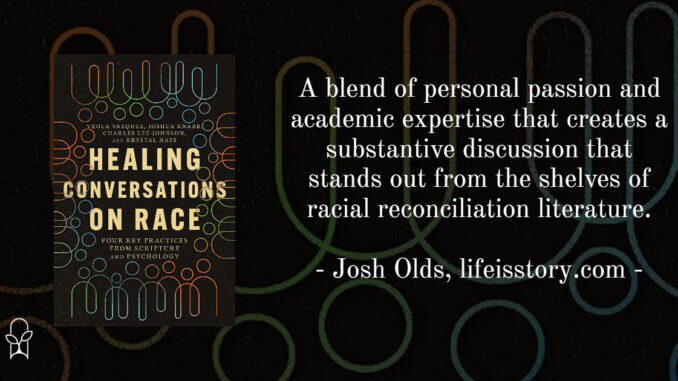
Published by IVP Academic on February 28, 2023
Genres: Academic, Non-Fiction, Racial Reconciliation
Buy on Amazon
Goodreads

Race complicates our relationships, even when we reject racism and seek to walk a better path together. How can we get our thinking―and our conversations―unstuck from entrenched patterns? In this book, four experts in psychology and social work present a model for how to build and deepen the cross-race relationships we want.
The starting place, they testify, must be a biblical understanding of the problem of racial disunity, grounded in the grand narrative of Scripture, followed by practical insights about psychology and social behavior. This book is the culmination of professional―but also deeply personal―conversations the authors have had with each other, wrestling together over current events, their own stories, and their roles in the healing process. They combine biblical teachings with psychological science to help Christians develop the skills to discuss race and ethnicity.
In each chapter, you will be guided through essential information, biblical examples, case studies, activities, and journaling exercises to prepare you to practice healing conversations. Using research from psychology, attachment theory, and emotionally focused therapy, this process will build your knowledge, self-awareness, other-awareness, and specific relational skills.
Jesus embodied love, challenged injustice, welcomed those rejected by society, and engaged in healing conversations with everyone he encountered. The insights and practices in Healing Conversations on Race will help Christians grow in Christlikeness and follow his example.
There are a lot of books on racial justice, both from a Christian and secular perspective. For a time, in the wake of George Floyd’s murder by police in 2020, the New York Times best-seller’s list was comprised completely of books about racial justice. Three years later, the conversation continues. The conversation continues because, while progress has made, there is still much more to be had. The conversation also continues because, quite frankly, there’s money to be made in it right now. I’ve read a lot of books on racial justice. Most of them are good. Most of them have their specific audience. Most of them have their specific perspective. And most of them all say pretty much the same thing. Healing Conversations on Race is different.
Healing Conversations on Race is a collaborative work between four members of the College of Behavioral and Social Sciences faculty at California Baptist University: Veola Vasquez (professor of psychology), Joshua Knabb (director of the PsyD program), Charles Lee-Johnson (pastor and professor of social work), and Krystal Hays (director of the DSW program). Dr. Knabb is white, while Drs. Vasquez, Lee-Johnson, and Hays are people of color. While this is an academic book, their experiences here are also personal. The book begins with each author writing a short introduction to their personal story and detailing their motivation for writing this book. That blend of personal passion and academic expertise helps build a substantive and relevant book that stands out amid the torrent of books on racial reconciliation.
At the crux of the book is a model for racial conversations called HEAL:
- Humility—Prayerfully Reflect
- Empathy—Identify Emotion and Need
- Acceptance—Consent to God’s Loving Presence
- Love—Respond with Christlikeness.
This is not a four-step process or in any way chronological. Rather, the authors envision this model as four elements needed to promote healing conversations and all of these elements co-exist and overlap simultaneously. Like the fruit of the Spirit, you can’t pick just one—there are all necessary and important to develop.
Each chapter of the book includes practical exercises such as lectio divina, personal reflection, prayer, and journaling exercises, equipping readers to engage in healing conversations on race. The book also contains race-related stories of real people affected by racial disunity and injustice, providing a practical and accessible approach to the subject. The last chapters offer additional training on how to conduct effective healing conversations on race and provide biblical encouragement to the readers. This element also helps Healing Conversations on Race stand out because it offers practical exercises in developing the concepts discussed in the book.
However, as an academic title, the book does take a somewhat academic tone. While this perhaps makes it offer more in substance, it also makes it less accessible to the average reader. Occasionally, it felt more like the authors were talking to fellow practitioners in the helping professions than to a layperson. Overall, while it is presented with more substance and academic rigor, the solutions that Vazquez, Knabb, Lee-Johnson, and Hays offer are fairly simple and straightforward—Treat others the way you would want to be treated, listen to their stories, learn from their perspectives.
One of the things that Healing Conversations on Race assumes is that people—the culture—wants to and is ready to have these conversations and that when these conversations are had they will be held in a rational fashion. I’m not convinced that’s the case. While the book does well in raising awareness of racial disparities and teaches us how to engage in cross-cultural conversations, something I’m still left wondering—and this simply may not have been the goal of this book—is how to start these conversations, how to start the healing, in the face of the unhelpful conversations about race that swirl on around us. That is the area where I think the book could have been stronger. Nonetheless, Healing Conversations on Race is a valuable resource, particularly for those engaged in psychology, counseling, pastoral, or chaplaincy professions.
